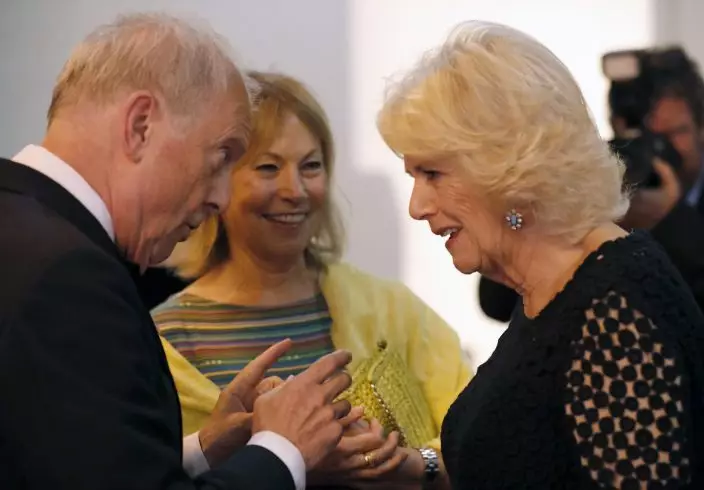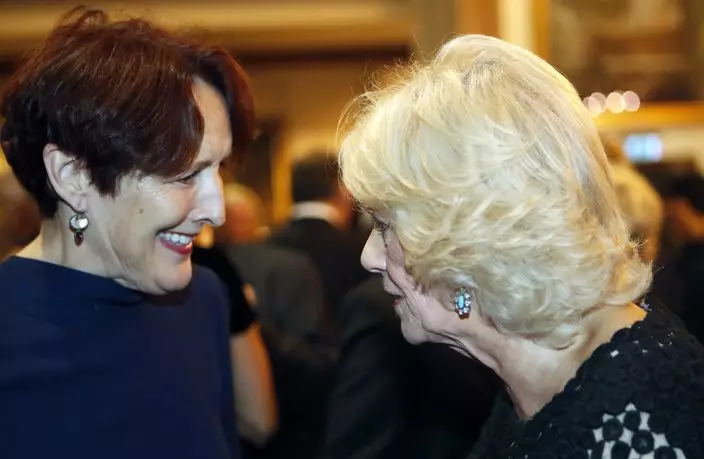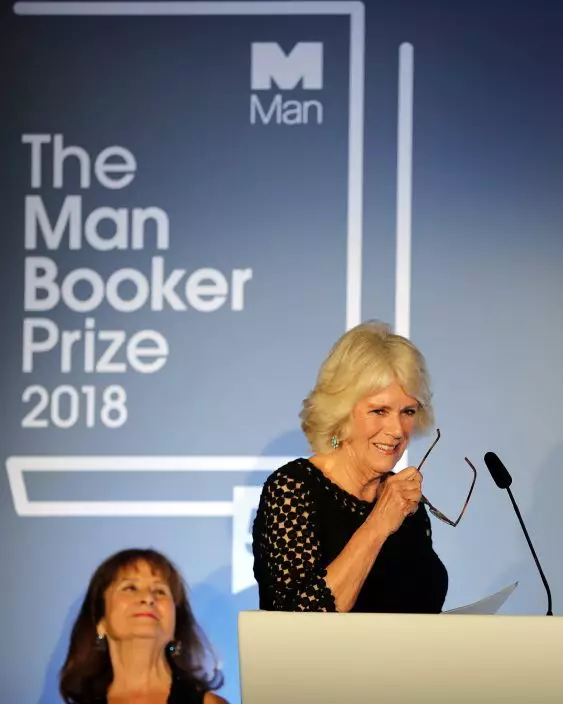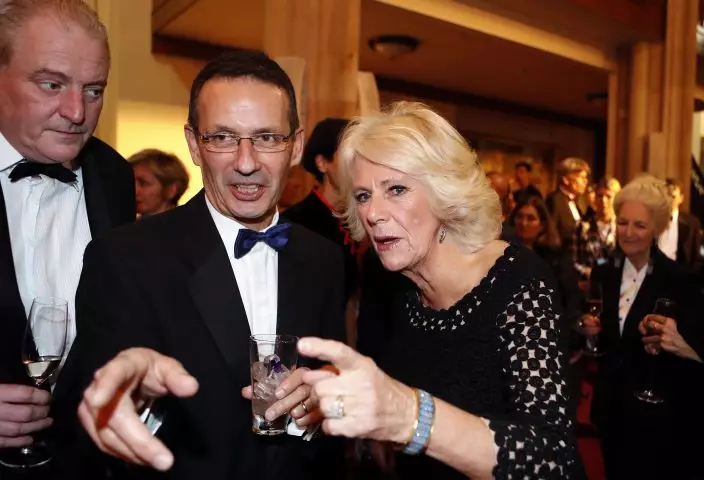Anna Burns won the prestigious Man Booker Prize for fiction Tuesday with "Milkman," a vibrant, violent story about men, women, conflict and power set during Northern Ireland's years of Catholic-Protestant violence.
Burns is the first writer from Northern Ireland to win the 50,000-pound ($66,000) prize, which is open to English-language authors from around the world. She received her trophy from Camilla, Duchess of Cornwall, during a black-tie ceremony at London's medieval Guildhall.
"Milkman" is narrated by a young woman dealing with an older man who uses family ties, social pressure and political loyalties as weapons of sexual coercion and harassment. It is set in the 1970s, but was published amid the global eruption of sexual misconduct allegations that sparked the "Me Too" movement.

Britain's Camilla, the Duchess of Cornwall talks to guests before she presents the Man Booker Prize for Fiction 2018 during the prize's 50th year at the Guildhall in London, Tuesday, Oct. 16, 2018.(AP PhotoFrank Augstein, Pool)
"I think this novel will help people to think about 'Me Too,' and I like novels that help people think about current movements and challenges," said philosopher Kwame Anthony Appiah, who chaired the judging panel. "But we think it'll last — it's not just about something that's going on in this moment.
"I think it's a very powerful novel about the damage and danger of rumor," he added,
Burns beat five other novelists, including the bookies' favorites: American writer Richard Powers' tree-centric eco-epic "The Overstory" and Canadian novelist Esi Edugyan's "Washington Black," the story of a slave who escapes from a sugar plantation in a hot-air balloon.

Britain's Camilla, the Duchess of Cornwall chats with actress Fiona Shaw before she presents the Man Booker Prize for Fiction 2018 during the prize's 50th year at the Guildhall in London, Tuesday, Oct. 16, 2018.(AP PhotoFrank Augstein, Pool)
The other finalists were U.S. novelist Rachel Kushner's "The Mars Room," set in a women's prison; Robin Robertson's "The Long Take," a verse novel about a traumatized D-Day veteran; and 27-year-old British author Daisy Johnson's Greek tragedy-inspired family saga "Everything Under."
Founded in 1969, the Man Booker Prize was originally open to British, Irish and Commonwealth writers. Americans have been eligible since 2014, and there have been two American winners — Paul Beatty's "The Sellout" in 2016 and George Saunders' "Lincoln in the Bardo" in 2017.
A third consecutive American victor would have revived fears among some U.K. writers and publishers that the prize is becoming too U.S.-centric. But Appiah said neither the nationality nor the gender of the authors was a factor in the judges' deliberations.

Britain's Camilla, the Duchess of Cornwall addresses the guests during the Man Booker Prize for Fiction 2018, the prize's 50th year, at the Guildhall in London, Tuesday, Oct. 16, 2018.(AP PhotoFrank Augstein, Pool)
"If we had been drifting towards thinking that one of the men on the list was the best one, I wouldn't have said 'No, guys, we're going to get in trouble for this' — any more than if we'd been drifting towards an American," he said. "We picked the one ... most deserving of the prize."
The Man Booker is always subject to intense speculation and lively betting, has a reputation for transforming writers' careers. Previous winners include Salman Rushdie, Ian McEwan, Arundhati Roy and Hilary Mantel.
It's likely to bring a big boost to Burns, who is 56-years-old and published two previous novels, but hardly a household name.

Britain's Camilla, the Duchess of Cornwall talks to guests before she presents the Man Booker Prize for Fiction 2018 during the prize's 50th year at the Guildhall in London, Tuesday, Oct. 16, 2018.(AP PhotoFrank Augstein, Pool)
"Milkman" appears on the printed page as a continuous torrent with few paragraph marks, which has led some to label it experimental and challenging. But Appiah said the vivid, distinctive Belfast language in Burns' book was "really worth savoring."
"If you're having difficulty, try reading it out loud," he said. "The pleasure of it really has to do with the way that it sounds.
"It's challenging in the way a walk up (mount) Snowdon is challenging. It's definitely worth it, because the view is terrific when you get to the top."
Follow Jill Lawless on Twitter at http://Twitter.com/JillLawless
NEW YORK (AP) — Even as many Americans say they learn about the 2024 election campaign from national news outlets, a disquieting poll reveals some serious trust issues.
About half of Americans, 53%, say they are extremely or very concerned that news organizations will report inaccuracies or misinformation during the election. Some 42% express worry that news outlets will use generative artificial intelligence to create stories, according to a poll from the American Press Institute and The Associated Press-NORC Center for Public Affairs Research.
The poll found 47% of Americans also expressing serious concern that news outlets would report information that has not been confirmed or verified, and 44% worry that accurate information will be presented in a way that favors one side or another.
Half of Americans say they get election news always or frequently from national news outlets, a percentage that is higher among older respondents, the poll found.
“The level of engagement is good,” said Michael Bolden, CEO of the American Press Institute. “The thing that's most concerning is that they're not sure they can actually trust the information.”
Years of suspicion about journalists, much of it sown by politicians, is partly responsible, he said. People are also less familiar with how journalism works. The poll found about half of respondents say they have at least a moderate amount of confidence in the information they receive from either national or local news outlets when it comes to the 2024 elections, though only about 1 in 10 say they have a great deal of confidence.
“There may have been a time when people knew a journalist because one lived on their block,” Bolden said. “The way the industry has been decimated, that's much less likely.”
Simply putting out the news often isn't good enough anymore, he said. There's a growing disconnect between news organizations and communities that the outlets need to address, by helping to let people know what journalists do and how people reporting news are their friends and neighbors, he said.
Outlets should lean into a convenor role, bringing people together for newsworthy events, he said.
About half of U.S. adults say they follow the news about presidential elections closely, with older adults being more engaged. About two-thirds of Americans age 60 or older say they keep a close eye on presidential election news, compared wth roughly one-third of those under age 30.
The same trend is seen with local and state election news. While the poll found that 46% of Americans age 60 or older say they follow news about local and state elections closely, only 16% of people age 18 to 29 said the same thing.
“As they transition to becoming older people, will they begin to care?” Bolden asked. “If they don't begin to care, what will that mean for local and state communities?”
Young people, those under age 30, are about as likely to get election news from social media or friends or family as they are to get it from national or local news outlets, the poll found. Black and Latino adults are somewhat more likely to express “a great deal” of confidence in the reliability of social media as a source of election news than white Americans are.
That's both a warning sign, since there is a lot more misinformation to be found on social media, and an opportunity for traditional outlets to make more of their work available this way, Bolden said.
About 6 in 10 Democrats say they get election news from national outlets at least frequently. That's more than the 48% of Republicans or 34% of independents, according to the poll. Republicans are more likely than Democrats and independents to express concern about inaccurate information or misinformation in news coverage during the upcoming elections. About 6 in 10 Republicans are concerned about this, compared with about half of Democrats.
Besides inaccuracies, many also expressed serious concern about election news that focuses too much on division or controversies or concentrates on who may win or lose — the horserace aspect of political coverage — rather than issues or the character of candidates.
Most Americans say that for them to make informed decisions about the 2024 state and local elections, they want national and local news outlets to highlight candidates’ values or their different positions on key social issues. In each case, about three-quarters of U.S. adults say they would like “a lot” or "some" coverage of these topics.
The poll of 2,468 adults was conducted March 21-25, 2024, using a sample drawn from NORC’s probability-based AmeriSpeak Panel, which is designed to be representative of the U.S. population. The margin of error is plus or minus 2.9 percentage points.
David Bauder writes about media for The Associated Press. Follow him at http://twitter.com/dbauder.

FILE - Journalists line the press stand before Republican presidential candidate former President Donald Trump speaks at a caucus night party in Des Moines, Iowa, Jan. 15, 2024. Attitudes toward the media and political news ahead of the election were explored in a poll from the American Press Institute and The Associated Press-NORC Center for Public Affairs Research. (AP Photo/Andrew Harnik, File)














